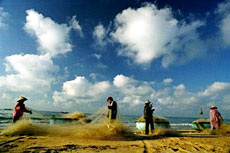Lagi Town in Binh Thuan Province has many breathtaking landscapes such as Duong Hill, Cam Binh Beach, Nganh Tam Tan Beach, Ba Islet or Thay Thim Temple.

And as much as the town in Binh Thuan Province is not that popular with tourists, it is a huge hit with budding photographers who like to shoot daily activities of fishing villages in Mui Da Beach in Tan Phuoc Commune.
From HCMC heading on National Highway 1A to T-junction No. 46 (about 46km to Phan Thiet City) you take a right turn to National Road No. 55 for 18km to reach Lagi.
Just as we checked into our hotel, sunset came down over town. Then in an instance the whole town went to sleep and the stillness overwhelmed all corners of the streets, just only lines of streetlights stayed awake. We took the hint and went to bed early and the next morning we witnessed the beautiful sunrise on the beach.
It took us about half an hour to get there. I shuddered when dewdrops dropped on my eyelashes as the road shriveled up under the dim lights of the motorbike reflecting on the mist and the black layer of asphalt.
Upon reaching the beach, we sneaked into a cafe and had a quick glimpse of the sea. Even though it was so early, it was so busy. Many locals were getting ready to serve food on the beach. They lit fires to boil water and set tables and chairs for visitors and workers. Some moments later, the aroma of noodles, cakes and hot drinks filled the air.
The sea was still dark but it was getting a bit crowded. Some people were sitting on the beach, smoking and merely gazing into the sea; others took ox carts to the grass to feed. The many photographers looked cumbersome carrying their cameras, lens and bags. They were as anxious as young males desperate for their prom date to show up. In the distance, there were some wooden boats heading towards the beach. Giant wooden boats with fishing nets, equipment, life buoys and of course batches of fish broke the waves, making thudding noises.
When the boats reached the beach, some men dragged the boats on the sand and others brought ox carts and tied a string around the ox’s shoulders to pull the boats ashore. The women went to take out the fish; some men sorted them into types and brought them away. As the sun rise came in all its glory, more boats sailed toward the beach. They had been fishing through the damp night, all sporting raincoats in a bid to fight against the cold. Drifting on the sea in darkness, they looked weary and desperate for bed, but this is their life and this is what they have to do to survive. The beach was too shallow for the larger boats and they needed help from small round wooden boats to bring products and devices to land. It was an interesting image to see a fishing village’s activities; it wasn’t typical but typical of Lagi.
At 9 a.m., when the morning catches were rounded up, owners of ox carts tramped around the beach while the ox strolled around to graze.
By late afternoon all the shops had closed. Some houses near the beach lit mosquito incense, creating a bitter smell of smoke. We strolled along the path to the wharf and listened to the wind whispering through pine leaves. I didn’t have a care in the world and prayed for the moment to last forever.
On the beach, hundreds of colorfully-painted wooden boats faced down on the sand. Waves silently crashed on the shore. I could see the dark blue sea and sky slowly turning dark. Sunset had arrived, the sea was so still, immense and void.